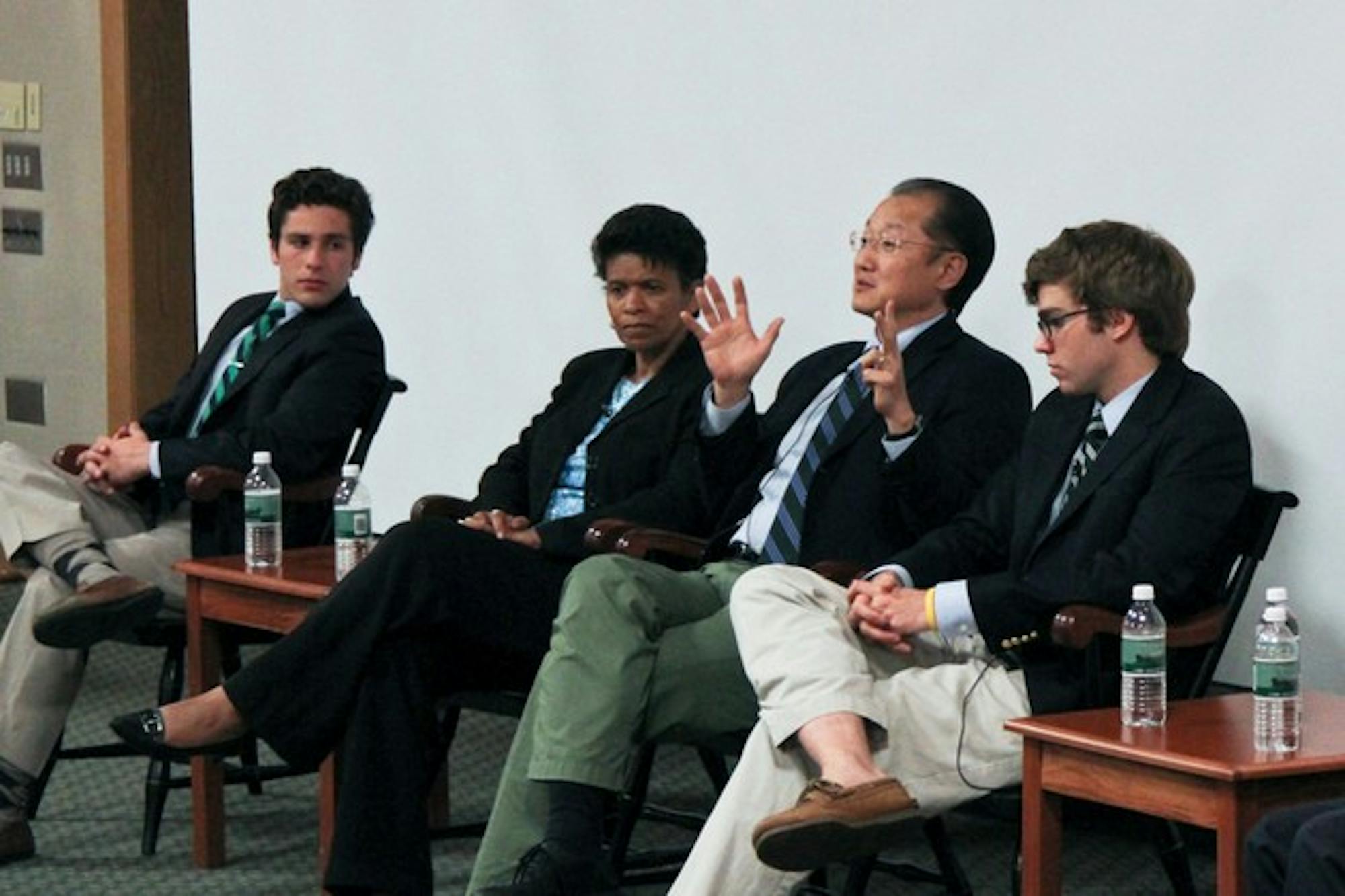Committee members hope these reforms will counter dangerous drinking trends, including the influx of students with blood alcohol concentrations above clinically dangerous levels and the consumption of hard alcohol at pre-games.
The College has witnessed an overall decrease in the number of students needing medical attention because of alcohol use, but the BACs of students who do require help have been increasing and a larger proportion of students requiring medical attention are being sent to Dartmouth-Hitchcock Medical Center.
Kim said he is kept up at night because "on a very regular basis we have near misses [of a student dying]."
"We are a hair's breadth away from having a death," Kim said. "Unless we go forward and make those kinds of changes, we are going to see it happen."
Some of the proposed changes, such as improving the alcohol education program for incoming students, will be implemented as quickly as possible, while ideas like liberalizing the keg policy will be considered in time, Kim said after the presentation in an interview.
The committee reached its conclusions after reading studies, interviewing experts, observing practices at peer institutions and examining data collected on campus over a three-month period, SPAHRC student co-chair William Schpero '10 said. The proposed changes which range from immediately feasible to long-term structural adjustments remain under review by the committee, student leaders, the College administration, town officials and the larger Dartmouth community.
"None of this is happening tomorrow and some of this may never happen," Schpero said, although he emphasized the importance of implementing other changes quickly.
Kim stressed that in order for the College to avoid Hanover Police compliance checks, BACs must be brought down, requiring a change in the College's social culture.
Policy Coordination
SPAHRC recommended creating a Dartmouth alcohol coordinator position at the associate or assistant dean level, which Kim called a "great idea" in an interview. Appointing a single coordinator is often the first change made by institutions that have suffered an alcohol-related death, according to Kim. The coordinator would supervise alcohol-related programs and initiatives within the Greek system, the Office of Residential Life, College Health Services and the Athletic Department, which currently send students mixed messages about alcohol consumption, according to Schpero.
"Our research suggested that it's a pretty common position," Schpero said, referring to similar positions at other colleges and universities.
The alcohol coordinator would be responsible for implementing a "sustainable, real-time" data monitoring program that tracks alcohol consumption at Dartmouth, as well as presenting monthly reports to senior administrators, according to the executive summary of the report. In the long term, the committee would like to see the development of an electronic student records system.
Greek Risk Management
The committee recommended reforming the Social Event Management Procedures, which are currently ignored because they are "grossly impractical," Schpero said.
SPAHRC suggested that administrators work with Greek organizations to transition from a can-based to a keg-based alcohol distribution system and amend party registration procedures.
"Kegs allow for the slow distribution of alcohol and more control over distribution," Schpero said.
Kim said that while he does not prefer one of his first initiatives to be the liberalization of keg policy, he understands that the action is critical to a harm-reduction approach to drinking. He added that he will examine more evidence about the merits of proposed changes before deciding whether to implement them.
SPAHRC found that first-year students, followed by sophomores, are most likely to require medical attention stemming from alcohol consumption, which is often the result of prevalent pre-gaming among underclassmen. Greek organizations should help curb pre-gaming by having a member stationed at the door during parties who is responsible for turning away clearly inebriated students, or calling a Good Sam for them if necessary.
"Our goal here is to create the message that if you as a first-year or sophomore student decided to pre-game, you will not be able to engage socially that evening," Schpero said.
SPAHRC recommended that a student committee under the auspices of the Greek Leadership Council monitor Greek houses to guarantee they comply with College alcohol policy. The report suggested that student monitors visit Greek organizations during their parties each weekend and report their findings to Greek house advisors and student leaders, but not College administrators.
"Our goal here is to create an internal system of accountability," Schpero said. "We think this is a great way to promote good risk management practices in Greek houses, and at the same time disincentivize pre-gaming among underclassmen."
Kim, who met with Greek leaders about SPAHRC's recommendation on the Wednesday before Green Key, said he was disappointed that more Greek representatives did not come to the presentation.
"We, with the administration, hope to work hand-in-hand with Greek leaders as we go forward," Schpero said in an interview. "They [Greek leaders] are incredibly important."
Good Samaritan Use
SPAHRC found that the number of Good Samaritan calls has increased in recent years. In 2006, the Good Sam policy was amended to give students more opportunities to use the system without punishment, leading to an increase in calls within the last two years.
"Students and organizations feel much more comfortable calling for help," SPAHRC student co-chair Max Yoeli '12 said.
Legal fears are the number one concern for students deciding whether to use the Good Sam policy, followed by punishments from the College, the committee found. The committee suggested ways to reform the system to alleviate tension with administrators, recommending that administrators eliminate the policy of sanctioning organizations if a student who is not a member of that organization makes a Good Sam call at its physical plant.
Education and Prevention
SPAHRC recommended improving alcohol education, which is currently "not in line with accepted standards," Schpero said.
The committee suggested holding information sessions about the Good Sam policy during First-Year Orientation and distributing videos and e-mails to parents of first-year students.
When first-year students matriculate, they would undergo an alcohol screening to identify predispositions for alcohol problems.
Dartmouth Health Care System
To provide more timely medical care, SPAHRC concluded that Safety and Security officers and Dartmouth Emergency Medical Services should breathalyze students who need medical help before they are transported to Dick's House, "making as effective a triage decision as possible," Schpero said.
Currently, inebriated students who are still conscious are first taken to Dick's House and are transported to DHMC via ambulance if they have a BAC above .30. All unresponsive students are immediately transported to DHMC.
"The time from the call for help to the time they are actually receiving help can be up to an hour," Schpero said. "Our goal is to make the system more effective, more efficient and make that time as small as possible."
The committee made further recommendations about making the Good Sam policy more accessible to students. Dick's House should stay open after regular operating hours during the Summer because students currently hesitate to call a Good Sam on peers out of fear that they will be sent to DHMC.
There should also be more Dartmouth emergency medical technicians at Dick's House on big weekends to increase the number of students it can accommodate, according to the report. Students are more likely to call Good Sam for intoxicated peers if they know they will not need to be transported to DHMC, which occurs when Dick's House is at capacity regardless of a patient's level of intoxication.
Advancing Town Communication
The committee supported the creation of a permanent town-College task force on alcohol consumption.
A task force headed by acting Dean of the College Sylvia Spears and consisting of administrators, students, alumni and town officials met for the first time last week and will meet for the second time today.
"[Town officials and I] have the same goals," Kim said. "We have to figure out ways of working together."
SPAHRC's three-month analysis of alcohol use on campus follows Hanover Police's announcement of its plan to conduct "compliance checks" in February, The Dartmouth previously reported. The police postponed the policy indefinitely in March.
SPAHRC is chaired by Kim and Molly Bode '09, as well as student co-chairs Yoeli and Schpero.
To realize the recommendations in the report, the committee will be restructured as the SPAHRC Implementation Committee.




